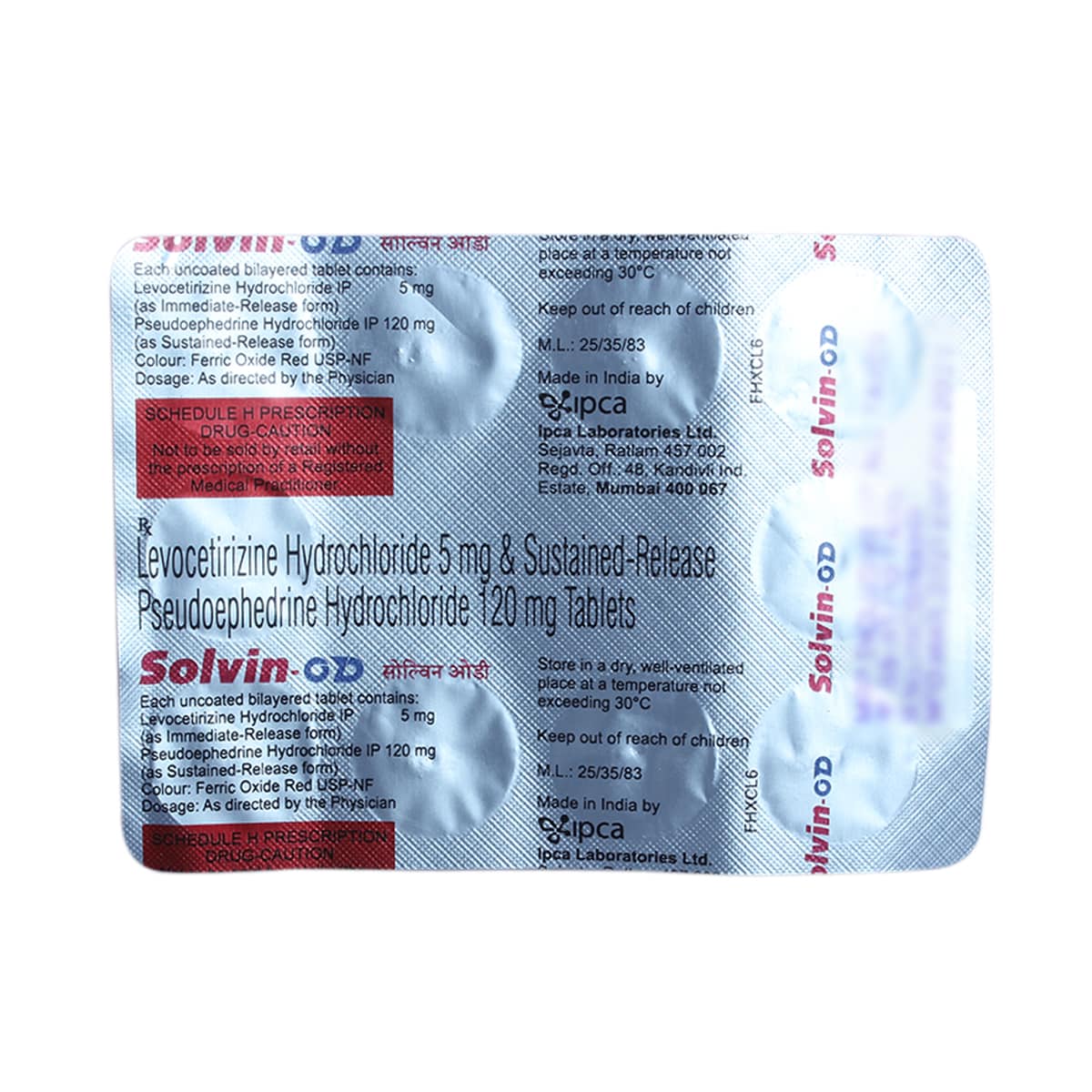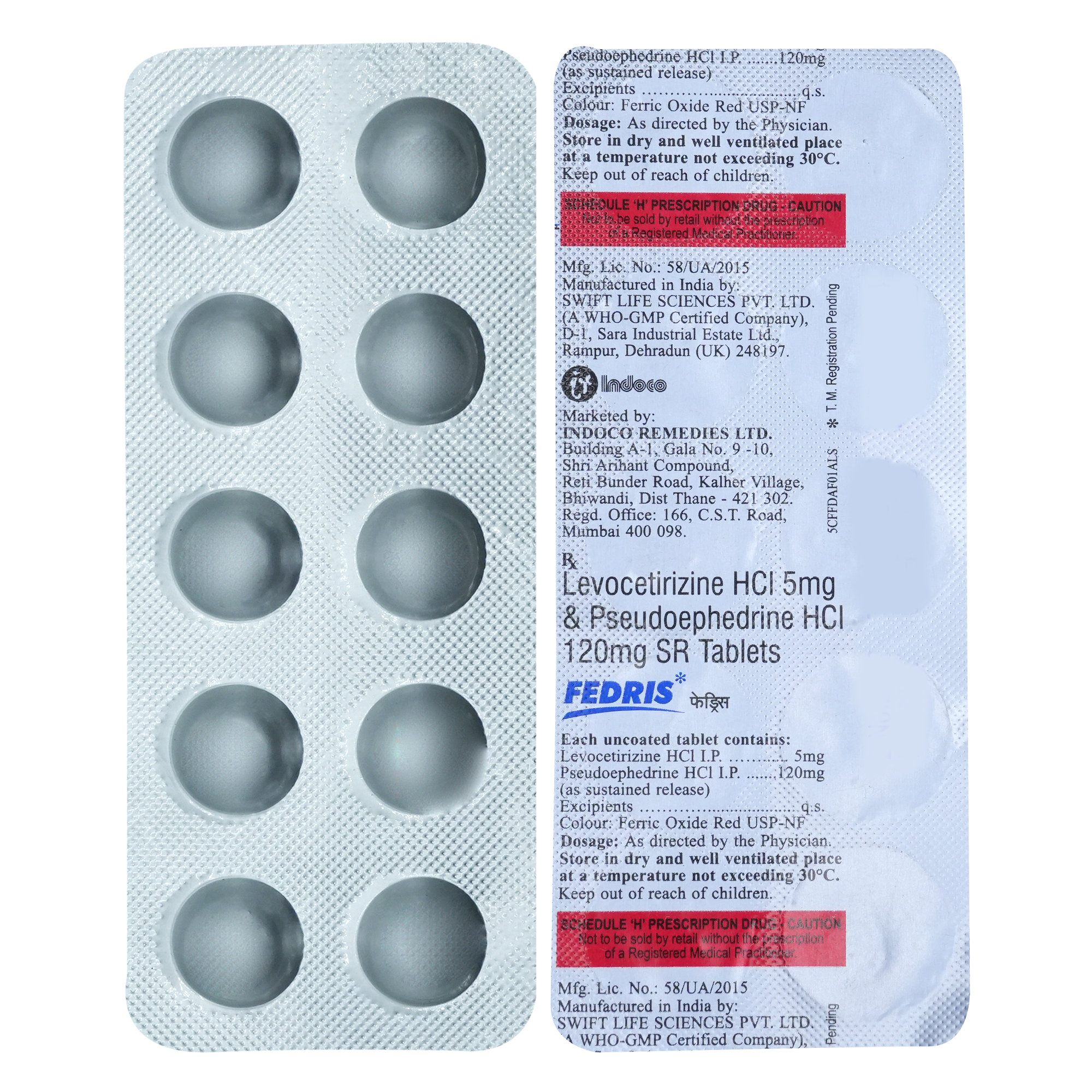Allrite D Tablet 10's


MRP ₹140.5
(Inclusive of all Taxes)
₹21.1 Cashback (15%)
Provide Delivery Location
Online payment accepted
 Prescription drug
Prescription drugWhats That
Composition :
Manufacturer/Marketer :
Consume Type :
Expires on or after :
Return Policy :
About Allrite D Tablet
Allrite D Tablet is a respiratory medication, primarily used to treat symptoms of the common cold, flu, and allergies such as sneezing, runny nose, nasal and sinus congestion, stuffy nose, or watery eyes. The common cold is a respiratory illness that affects the nose and throat and is caused by viruses known as 'rhinoviruses'. The virus enters the body through the nose, mouth or eyes and spreads quickly through air droplets when a sick person sneezes, coughs or talks.
Allrite D Tablet consists of two medicines: Levocetirizine (antihistamine) and Pseudoephedrine (decongestant). Levocetirizine belongs to the class of antihistamines or anti-allergic that works by blocking the action of histamine, a substance responsible for causing allergic reactions. It helps to provide relief from allergy symptoms such as sneezing, running nose, watery eyes, itching, swelling, and congestion or stiffness. On the other hand, Pseudoephedrine belongs to the class of decongestant drugs. Works by narrowing small blood vessels in your nose. This helps mucus and airflow more freely in the cavities in your nose (sinuses), helping you to breathe more easily. Altogether Allrite D Tablet relieves the symptoms from common cold symptoms.
Take Allrite D Tablet as prescribed. Your doctor will recommend how often you take Allrite D Tablet based on your medical condition. Do not stop taking Allrite D Tablet on your own until the doctor advised you to do so. Some people may experience headaches, dry mouth, nausea, vomiting, tiredness, sleepiness, and drowsiness. Most of these side effects of Allrite D Tablet do not require medical attention and gradually resolve over time. However, if the side effects persist or worsen, please consult your doctor
If you are allergic to Allrite D Tablet or any other medicines, please tell your doctor. If you are pregnant or breastfeeding, it is advised to inform your doctor before using Allrite D Tablet . Allrite D Tablet is not recommended for children below 12 years of age. Do not take Allrite D Tablet if you suffer from severe kidney disease. Drink plenty of fluids while taking Allrite D Tablet to loosen mucus. Before taking Allrite D Tablet , inform your doctor if you have kidney, or severe liver problems, thyroid disorder, blocked arteries, prostate problems, diabetes, glaucoma, or heart disease. Avoid alcohol while taking Allrite D Tablet , since it can worsen the side effects like dizziness and sleepiness.
Uses of Allrite D Tablet
Directions for Use
Key Benefits
Allrite D Tablet is a combination of two drugs: Levocetirizine and Pseudoephedrine primarily used to treat symptoms of allergy and the common cold. Levocetirizine belongs to the class of antihistamines (anti-allergic drugs) that works by blocking the action of histamine, a substance responsible for causing allergic reactions. It helps provide relief from allergy symptoms such as sneezing, running nose, watery eyes, itching, swelling, congestion, or stiffness. Pseudoephedrine belongs to the class of decongestant drugs. Works by narrowing small blood vessels in your nose. This helps mucus and airflow more freely in the cavities in your nose (sinuses), helping you to breathe more easily. Altogether Allrite D Tablet relieves the symptoms from common cold symptoms.
Storage
- Avoid driving or operating machinery or activities that require high focus until you know how the medication affects you.
- Maintain a fixed sleeping schedule, create a relaxing bedtime routine and ensure your sleeping space is comfortable to maximize your sleep quality.
- Limit alcohol and caffeine as these may worsen drowsiness and disturb sleep patterns.
- Drink plenty of water as it helps with alertness and keeps you hydrated and for overall well-being.
- Moderate physical activity can improve energy levels, but avoid intense workouts right before bedtime.
- Inform your doctor about the common cold symptoms you're experiencing due to medication.
- Your doctor may adjust your treatment plan, which could include changing your medication, adding new medications, or offering advice on managing your symptoms.
- Practice good hygiene, including frequent handwashing, avoiding close contact with others, and avoiding sharing utensils or personal items.
- Drink plenty of fluids, such as warm water or soup, to help thin out mucus.
- Get plenty of rest and engage in stress-reducing activities to help your body recover. If your symptoms don't subside or worsen, consult your doctor for further guidance.
- Rest well; get enough sleep.
- Eat a balanced diet and drink enough water.
- Manage stress with yoga and meditation.
- Limit alcohol and caffeine.
- Physical activities like walking or jogging might help boost energy and make you feel less tired.
- Inform your doctor about dry mouth symptoms. They may adjust your medication regimen or prescribe additional medications to manage symptoms.
- Drink plenty of water throughout the day to help keep your mouth moist and alleviate dry mouth symptoms.
- Chew sugar-free gum or candies to increase saliva production and keep your mouth moisturized.
- Use saliva substitutes, such as mouthwashes or sprays, only if your doctor advises them to help moisturize your mouth and alleviate dry mouth symptoms.
- Avoid consuming smoking, alcohol, spicy or acidic foods, and other irritants that may aggravate dry mouth symptoms.
- Schedule regular dental check-ups to keep track of your oral health and handle any dry mouth issues as they arise.
- Inform your doctor about dizziness symptoms. They may adjust your medication regimen or prescribe additional medications to manage symptoms.
- Follow your doctor's instructions for taking medication, and take it at the same time every day to minimize dizziness.
- When standing up, do so slowly and carefully to avoid sudden dizziness.
- Avoid making sudden movements, such as turning or bending quickly, which can exacerbate dizziness.
- Drink plenty of water throughout the day to stay hydrated and help alleviate dizziness symptoms.
- If you're feeling dizzy, sit or lie down and rest until the dizziness passes.
- Track when dizziness occurs and any factors that may trigger it, and share this information with your doctor to help manage symptoms.
Drug Warnings
If you are allergic to Allrite D Tablet or any other medicines, please tell your doctor. If you are pregnant or breastfeeding, it is advised to inform your doctor before using Allrite D Tablet . Allrite D Tablet is not recommended for children below 12 years of age. Drink plenty of fluids while taking Allrite D Tablet to loosen mucus. If you have glaucoma, prostate problems, thyroid disorder, blocked arteries or veins, diabetes, heart disease, inform your doctor before taking Allrite D Tablet . Before taking Allrite D Tablet , inform your doctor if you are already taking medicines like high blood pressure medications such as guanethidine, and methyldopa; drugs used to control heart rhythms or contractions such as digoxin; Oxytocin (a drug used to help contractions during childbirth). Do not take Allrite D Tablet if you are already taking, or have taken in the last two weeks, medicines for depression known as Monoamine Oxidase Inhibitors (MAOIs).
Drug-Drug Interactions
Drug-Drug Interactions
Login/Sign Up
Using esketamine together with Allrite D Tablet may increase side effects (drowsiness, confusion, difficulty concentrating, and impairment in thinking, judgment, reaction speed, and motor coordination).
How to manage the interaction:
Taking Allrite D Tablet with Esketamine together can result in an interaction, but it can be taken if a doctor has advised it. Do not discontinue any medications without consulting a doctor.
Drug-Food Interactions
Drug-Food Interactions
Login/Sign Up
Diet & Lifestyle Advise
- Avoid dairy products such as milk as they may increase mucus production. Also, avoid processed or refined foods to have relief from cough. Instead replace baked foods, fried foods, white bread, white pasta, French fries, sugary desserts, and chips with green leafy vegetables.
- Drink plenty of fluids to avoid dry throat while you have a cough and loosen mucus.
- Avoid citrus fruits as they may worsen the cough. Eat fruits rich in water content such as pears, watermelon, peaches, and pineapples.
- Know your triggers like allergens, such as pollen, dust, and food items that make your asthma and other respiratory diseases severe.
- Quit smoking and avoid passive smoking. Smoking may reduce the effectiveness of the medicine.
- Drink warm fluids while you take Allrite D Tablet to help loosen congestion and lubricate the throat.
- Eat a healthy diet and exercise regularly to strengthen your breathing muscles and boost your immune system.
- Learning breathing exercises will help you move more air in and out of your lungs.
- Avoid consumption of alcohol with Allrite D Tablet as it may cause tiredness, drowsiness, or lack of concentration.
Side Effects of Allrite D Tablet
- Headache
- Dry mouth
- Nausea
- Vomiting
- Restlessness
- Tiredness
- Dizziness
Habit Forming
Therapeutic Class
All Substitutes & Brand Comparisons
RX
Out of StockHatric 2 mg Tablet 10's
Aristo Pharmaceuticals Pvt Ltd
₹19.3
(₹1.74 per unit)
86% CHEAPERRX
Out of StockDolev 5mg/120mg Tablet
Ajanta Pharma Ltd
₹31
(₹2.79 per unit)
77% CHEAPERRX
Out of StockRizi D 5 mg/120 mg Tablet
Comed Chemicals Ltd
₹31.06
(₹2.8 per unit)
77% CHEAPER
Product Substitutes
Drug-Diseases Interactions
Drug-Diseases Interactions
Login/Sign Up
FAQs
Yes, Allrite D Tablet may cause dry mouth as a temporary side effect in some people. It is not necessary for everyone taking Allrite D Tablet to experience this side effect. However, to avoid such side effects, drink plenty of water, regularly rinse your mouth, practice good oral hygiene and suck on sugarless candy. However, if the condition persists or worsens, please consult a doctor.
Allrite D Tablet is not recommended for use in patients with prostate enlargement, since Pseudoephedrine may cause or worsen urinary difficulty in patients with prostate enlargement. It is advised to consult your doctor before using Allrite D Tablet .
No, you are not recommended to stop taking Allrite D Tablet without consulting your doctor as it may worsen the condition or cause recurring symptoms. Therefore, take Allrite D Tablet for as long as your doctor has prescribed it, and if you experience any difficulty while taking Allrite D Tablet , please consult your doctor.
Take the missed dose as soon as possible. However, if it is time for the next dose, skip the missed dose and go back to your regular dosing schedule.
Allrite D Tablet consists of two medicines: Levocetirizine and Pseudoephedrine. Levocetirizine belongs to the class of antihistamines or anti-allergic that works by blocking the action of histamine, a substance responsible for causing allergic reactions. It helps provide relief from allergy symptoms such as sneezing, running nose, watery eyes, itching, swelling, congestion, or stiffness. On the other hand, Pseudoephedrine belongs to the class of decongestant drugs. Works by narrowing of small blood vessels in your nose. This helps mucus and airflow more freely in the cavities in your nose (sinuses), helping you to breathe more easily. Altogether it relieves the symptoms from common cold symptoms.
Drug-Drug Interactions Checker List
- RITONAVIR
- THEOPHYLLINE
- ATENOLOL
- CARVEDILOL
- LABETALOL
- METOPROLOL
- NADOLOL
- PROPRANOLOL
- AMITRIPTYLINE
- DOXEPIN
Special Advise
Regular eye checkup in patients with glaucoma.
Disease/Condition Glossary
Common cold: The common cold is an infection caused by viruses, mainly 'rhinovirus' affecting your nose and throat (upper respiratory tract). Children younger than six years of age are at the most significant risk of colds, but healthy adults can also be affected to have 2-3 colds annually. In most cases, cold symptoms are recovered within a week or ten days. However, symptoms might last longer in people who smoke or are exposed to allergens like dust, pollutants, etc. Symptoms of a common cold might include a stuffy or runny nose, sore throat, cough, congestion, mild body pain or a mild headache, sneezing, low-grade fever, and feeling unwell (malaise).
An allergy is an immune system response to foreign elements typically not harmful to your body. These foreign elements are known as allergens.’ Allergic condition varies from person to person. Some might be allergic to certain foods and seasonal allergies like hay fever. At the same time, others might be allergic to pollen or pet dander. Allrite D Tablet is a non-drowsy antihistamine which makes it less likely to make you feel sleepy compared to other antihistamines or antiallergics.

Have a query?
Buy best Anti Allergic Drugs products by
Cipla Ltd
Micro Labs Ltd
Sun Pharmaceutical Industries Ltd
Alkem Laboratories Ltd
Mankind Pharma Pvt Ltd
Dr Reddy's Laboratories Ltd
Lupin Ltd
Leeford Healthcare Ltd
Abbott India Ltd
Intas Pharmaceuticals Ltd
Glenmark Pharmaceuticals Ltd
Morepen Laboratories Ltd
Alembic Pharmaceuticals Ltd
Aristo Pharmaceuticals Pvt Ltd
East West Pharma India Pvt Ltd
Hetero Drugs Ltd
Torrent Pharmaceuticals Ltd
Systopic Laboratories Pvt Ltd
Zydus Cadila
Ajanta Pharma Ltd
Canixa Life Sciences Pvt Ltd
FDC Ltd
Macleods Pharmaceuticals Ltd
Zuventus Healthcare Ltd
Hegde & Hegde Pharmaceutica Llp
Kivi Labs Ltd
Koye Pharmaceuticals Pvt Ltd
Medishri Healthcare Pvt Ltd
Rapross Pharmaceuticals Pvt Ltd
Sanofi India Ltd
Unison Pharmaceuticals Pvt Ltd
Wockhardt Ltd
Biochem Pharmaceutical Industries Ltd
Elder Pharmaceuticals Ltd
Indoco Remedies Ltd
Fourrts India Laboratories Pvt Ltd
Zydus Healthcare Ltd
Amwill Healthcare Pvt Ltd
Bayer Pharmaceuticals Pvt Ltd
Corona Remedies Pvt Ltd
Indiabulls Pharmaceuticals Pvt Ltd
Ipca Laboratories Ltd
Klm Laboratories Pvt Ltd
Olcare Laboratories Pvt Ltd
Talent India Pvt Ltd
Zee Laboratories Ltd
Auspharma Pvt Ltd
Biocute Life Care
Cadila Healthcare Ltd
Dolvis Bio Pharma Pvt Ltd
Entod Pharmaceuticals Ltd
Indchemie Health Specialities Pvt Ltd
Levin Life Sciences Pvt Ltd
Med Manor Organics Pvt Ltd
Pristine Pearl Pharma Pvt Ltd
Rockmed Pharma Pvt Ltd
Troikaa Pharmaceuticals Ltd
Uniza Healthcare Llp
Cadila Pharmaceuticals Ltd
Capital Pharma
Cnx Health Care Pvt Ltd
Eumedica Pharamceuticals
Galcare Pharmaceuticals Pvt Ltd
GlaxoSmithKline Pharmaceuticals Ltd
Knoll Healthcare Pvt Ltd
Medgen Drugs And Laboratories Pvt Ltd
Oaknet Healthcare Pvt Ltd
Seagull Pharmaceutical Pvt Ltd
Skn Organics Pvt Ltd
Unipark Biotech Pvt Ltd
Akumentis Healthcare Ltd
Apex Laboratories Pvt Ltd
Atopic laboratories Pvt Ltd
Aurz Pharmaceutical Pvt Ltd
Biophar Lifesciences Pvt Ltd
Delcure Life Sciences Ltd
Eris Life Sciences Ltd
Gladstone Pharma India Pvt Ltd
Heal (India) Laboratories Pvt Ltd
Inex Medicaments Pvt Ltd
Keimed Pvt Ltd
Kepler Healthcare Pvt Ltd
Lividus Pharmaceuticals Pvt Ltd
Monichem Healthcare Pvt Ltd
Nova Indus Pharmaceuticals
Psychotropics India Ltd
RPG Life Sciences Ltd
Rnd Laboratories Pvt Ltd
SMG Global Pharma
TTK Healthcare Ltd
Vasu Organics Pvt Ltd
Votary Laboratories (India) Ltd
Yaher Pharma
Yuventis Pharmaceuticals
Acclimate Life Sciences
Bioceutics Inc
Biochemix Health Care Pvt Ltd
Brinton Pharmaceuticals Ltd
Chlorophyll Pharmaceuticals
DR Johns Lab Pharma Pvt Ltd
Alcohol
Safe if prescribed
It is advised to avoid consuming alcohol with Allrite D Tablet as it could lead to increased drowsiness or dizziness.
Pregnancy
Consult your doctor
The safety of Allrite D Tablet in pregnant women is unknown. Therefore, it is given to pregnant women only if the doctor thinks the benefits outweigh the risks.
Breast Feeding
Consult your doctor
The safety of Allrite D Tablet in breast-feeding women is unknown. Therefore, it is given to breast-feeding women only if the doctor thinks benefits outweigh risks.
Driving
Safe if prescribed
Do not drive or operate machinery if you experience sleepiness, dizziness while using Allrite D Tablet . This may affect your ability to drive. Seek medical attention if the symptoms persist longer.
Liver
Consult your doctor
Allrite D Tablet should be used with caution in patients with severe liver diseases. Let your doctor know if you have any history of liver diseases or hepatic impairment. Your doctor will weigh the benefits and potential risks before prescribing Allrite D Tablet .
Kidney
Consult your doctor
Allrite D Tablet should be used with caution in patients with kidney diseases. Let your doctor know if you have any history of kidney diseases. Your doctor will weigh the benefits and potential risks before prescribing Allrite D Tablet .
Children
Safe if prescribed
Allrite D Tablet is not recommended for children less than 12 years of age.







